Motivational Letter For Students
[Your Name]
[Your Address]
[City, State, Zip Code]
[Email Address]
[Phone Number]
[Date]
To All Students,
Subject: Embracing the Journey of Growth and Success
Dear Students,
I hope this letter finds you all in high spirits and eager to embark on a new chapter of your educational journey. As we begin this academic year, I want to take a moment to share some words of motivation and encouragement with each and every one of you.
Starting or continuing your educational pursuits can be both exciting and daunting. You may find yourselves facing new challenges, rigorous coursework, and moments of uncertainty. However, remember that every step you take on this journey is an opportunity for growth and personal development.
Throughout your academic endeavors, there will be times when you may feel overwhelmed, questioning your abilities or wondering if you are on the right path. During such moments, it is crucial to remind yourselves of the reasons that brought you here in the first place. Reflect on your dreams, aspirations, and the vision you have for your future. Each one of you has unique talents, strengths, and potential waiting to be unleashed.
Embrace failure as a stepping stone toward success. We often learn the most from our setbacks and mistakes. Instead of seeing failure as a dead-end, see it as an essential part of the learning process. Do not let fear of failure hinder your progress. Instead, let it inspire you to push your boundaries, take risks, and pursue excellence.
Remember, success is not solely about achieving the highest grades or accolades. It is about the journey you take and the person you become along the way. Cultivate a growth mindset, where challenges are opportunities, and dedication leads to improvement. Allow yourselves to evolve and adapt, as growth is a continuous process that knows no bounds.
Furthermore, support and encourage one another. Together, you can create an environment that fosters collaboration, compassion, and inclusivity. Be the positive force that uplifts your peers, and remember that we all benefit when we lift each other up.
In the face of obstacles, never hesitate to seek help and guidance. Your teachers, mentors, and fellow students are here to support you. Whether it is seeking advice on academics, personal challenges, or career choices, know that you are not alone on this journey.
Lastly, cherish every moment of this chapter in your lives. Time passes swiftly, and before you know it, you will have crossed this threshold and moved onto new horizons. So, make the most of your experiences, embrace the diversity of knowledge, and be open to the myriad of possibilities that await you.
In conclusion, my dear students, know that you possess the potential to achieve greatness. Embrace your uniqueness, face challenges with courage, and strive for excellence with passion. Together, let us make this academic year one of inspiration, growth, and unforgettable memories.
I have faith in each and every one of you and cannot wait to witness the incredible transformations that will unfold throughout this journey. Remember, you have the power to shape your destiny. Make it extraordinary!
Wishing you all a fantastic and fulfilling academic year.
Sincerely,
[Your Name]
Heartfelt Motivational Letter for College Application
Subject: Motivation for College Admission
Dear Admissions Committee,
I am writing to express my sincere motivation to join [University Name]. My academic journey has been fueled by curiosity, perseverance, and a commitment to personal growth.
Through my involvement in [Activities/Projects], I have developed skills in leadership, teamwork, and problem-solving that I am eager to bring to your institution. I am confident that this program will allow me to contribute positively while advancing my knowledge.
Thank you for considering my application. I look forward to the opportunity to be part of [University Name].
Sincerely,
[Your Name]
Creative Motivational Letter for Scholarship
Subject: Scholarship Application Motivation
Dear [Scholarship Committee],
Education is the key to transforming dreams into reality. Receiving the [Scholarship Name] will enable me to pursue my academic goals without financial barriers.
My dedication to [Field of Study/Community Work] has allowed me to develop both academically and personally. I am eager to leverage this scholarship to make meaningful contributions to my field and society.
Thank you for considering my application.
Best regards,
[Your Name]
Professional Motivational Letter for Internship
Subject: Application for Internship Opportunity
Dear [Recipient Name],
I am enthusiastic about applying for the internship at [Company Name]. My academic background in [Field of Study] and hands-on experience in [Relevant Projects] have prepared me to contribute effectively to your team.
I am particularly interested in [Specific Area] and believe that this internship will help me gain practical skills while making valuable contributions to your organization. I am committed to learning and dedicated to excellence.
Thank you for your time and consideration.
Sincerely,
[Your Name]
Casual Motivational Email for Online Course Enrollment
Subject: Excited to Join [Course Name]
Hi [Instructor/Coordinator Name],
I hope you’re doing well! I’m writing to express my excitement about enrolling in [Course Name]. Learning this subject has been a personal goal of mine, and I am eager to engage fully with the course materials and discussions.
I look forward to expanding my skills and applying them in real-life contexts. Thank you for offering this opportunity!
Best,
[Your Name]
Formal Motivational Letter for Exchange Program
Subject: Motivation for Student Exchange Program
Dear [Program Coordinator],
I am writing to express my keen interest in participating in the [Exchange Program Name] at [Institution]. This opportunity represents a unique chance to broaden my academic and cultural horizons.
My academic achievements, coupled with my involvement in [Extracurricular Activities], demonstrate my readiness for this program. I am confident that my participation will be mutually enriching for both the host institution and myself.
Thank you for your consideration.
Sincerely,
[Your Name]
Simple and Quick Motivational Letter for Workshop Attendance
Subject: Motivation to Attend [Workshop Name]
Dear [Organizer Name],
I am eager to attend the [Workshop Name] to enhance my skills in [Topic/Field]. Participating in this workshop will allow me to learn from experts and apply knowledge in practical settings.
Thank you for considering my application.
Kind regards,
[Your Name]
Heartfelt Motivation for Academic Improvement
Subject: Motivation to Improve Academically
Dear [Teacher/Mentor Name],
I am writing to express my determination to improve my academic performance in [Subject/Field]. I recognize areas where I need to focus and am committed to putting in the necessary effort.
Your guidance and support will be invaluable as I work to achieve better results. Thank you for your encouragement and patience.
Sincerely,
[Your Name]
Creative Motivation for Participating in Competitions
Subject: Motivation to Participate in [Competition Name]
Dear [Organizer Name],
I am excited to participate in [Competition Name] and showcase my abilities in [Field/Skill]. Engaging in this competition will challenge me to grow, innovate, and collaborate effectively with peers.
I am enthusiastic about contributing my skills and learning from other participants. Thank you for providing this inspiring opportunity.
Best regards,
[Your Name]
What and why of Motivational Letters for Students
Motivational letters are written communications by students to express their enthusiasm, goals, and qualifications for academic, professional, or extracurricular opportunities.
- Serve as a personal statement highlighting skills, experiences, and ambitions.
- Persuade selection committees, instructors, or organizers to consider the student for opportunities.
- Demonstrate commitment, passion, and readiness for challenges.
Who should write a Motivational Letter
- Students applying for universities, colleges, or schools.
- Applicants for scholarships or financial aid.
- Participants seeking internships, workshops, or exchange programs.
- Individuals pursuing competitions, projects, or research opportunities.
Whom these letters should be addressed to
- Admissions committees of educational institutions.
- Scholarship or grant committees.
- Internship coordinators or supervisors.
- Workshop organizers and competition judges.
- Mentors, teachers, or academic advisors in cases of personal motivation letters.
When to write a Motivational Letter
- During applications for schools, colleges, or universities.
- When seeking scholarships or financial aid.
- Prior to enrolling in courses, workshops, or exchange programs.
- Before participating in competitions or academic events.
- To request guidance, mentorship, or personal academic improvement.
How to write an effective Motivational Letter
- Research the program, scholarship, or opportunity thoroughly.
- Begin with a clear and engaging introduction.
- Highlight relevant academic achievements, skills, and experiences.
- Explain personal motivation and goals concisely.
- Maintain a professional yet authentic tone.
- Conclude with a polite expression of gratitude and anticipation.
Requirements and Prerequisites for writing Motivational Letters
- Accurate details about the program, scholarship, or opportunity.
- Knowledge of personal achievements, skills, and goals.
- Understanding of the selection criteria.
- Proofreading tools or mentors to review the letter for clarity and correctness.
Formatting and Style Recommendations
- Length: typically 1–2 pages or 400–800 words.
- Tone: formal for official applications, casual for workshops or emails.
- Style: structured paragraphs with logical flow.
- Mode: printed letter or email depending on submission guidelines.
- Etiquette: polite, enthusiastic, and honest communication.
After Sending / Follow-up
- Confirm receipt if sent by email or online portal.
- Follow up politely if no response is received within the expected timeframe.
- Keep a copy of the letter for future reference or subsequent applications.
Pros and Cons of sending Motivational Letters
Pros:
- Provides a personal perspective beyond grades or resumes.
- Highlights unique qualities and commitment.
- Can distinguish the applicant in competitive situations.
Cons:
- Poorly written letters may negatively impact perception.
- Overly generic content can reduce effectiveness.
- Requires careful reflection and time to craft effectively.
Tricks and Tips for Motivational Letters
- Personalize each letter for the specific opportunity.
- Use concrete examples to illustrate skills and achievements.
- Keep sentences clear and concise.
- Avoid clichés and overly formal jargon.
- End with a strong, confident closing statement.
Common Mistakes to Avoid
- Writing a generic letter without tailoring to the opportunity.
- Overemphasizing personal hardships without connecting to goals.
- Ignoring grammar, spelling, or formatting.
- Failing to clearly state motivation and objectives.
- Exceeding word limits or being too brief to convey intent.
Elements and Structure of Motivational Letters
- Introduction: Purpose of writing and enthusiasm.
- Body Paragraphs: Academic achievements, skills, experiences, and motivations.
- Conclusion: Summary of intent, gratitude, and anticipation of response.
- Signature: Name, contact information, and date.
- Attachments: Resume, transcripts, or other supporting documents if required.
Does it require attestation or authorization
- Generally, motivational letters do not require attestation.
- Some formal applications may require recommendation letters to accompany the motivation letter.
- For scholarships or legal programs, certification of authenticity or signature may occasionally be requested.
How many letters should a student prepare
- One for each distinct application or opportunity.
- Tailored versions for universities, scholarships, workshops, or internships.
- Avoid sending the same letter unchanged to multiple recipients.
Compare and Contrast with Other Application Materials
- Motivational Letter vs. Resume: Resume lists facts; motivational letter explains purpose, goals, and enthusiasm.
- Motivational Letter vs. Personal Statement: Personal statements are broader narratives; motivational letters focus on specific opportunity and motivation.
- Motivational Letter vs. Recommendation Letter: Motivational letters are written by the student; recommendation letters are written by mentors or teachers supporting the applicant.

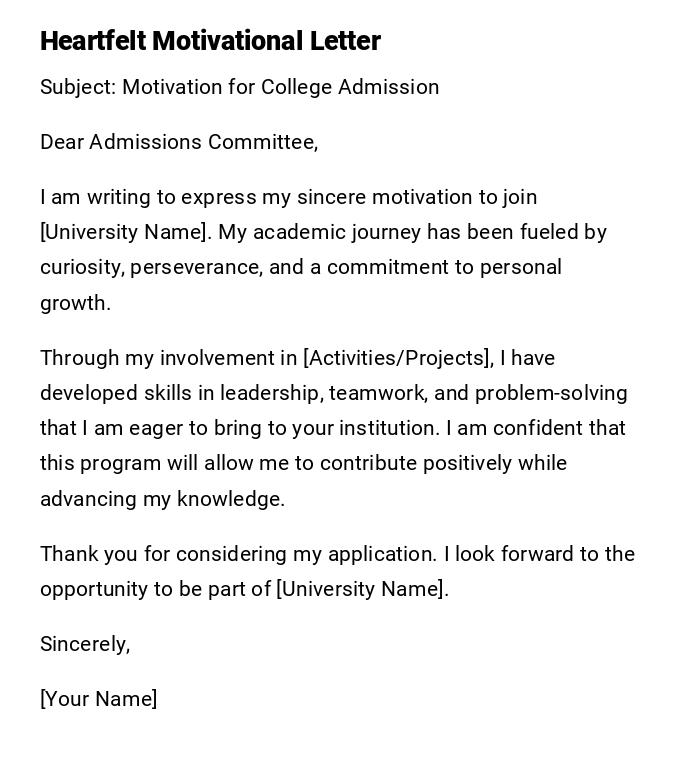
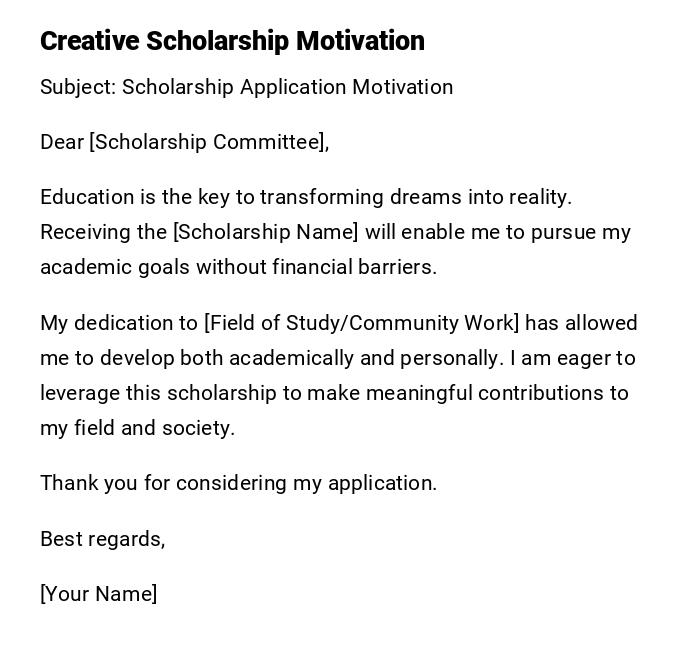
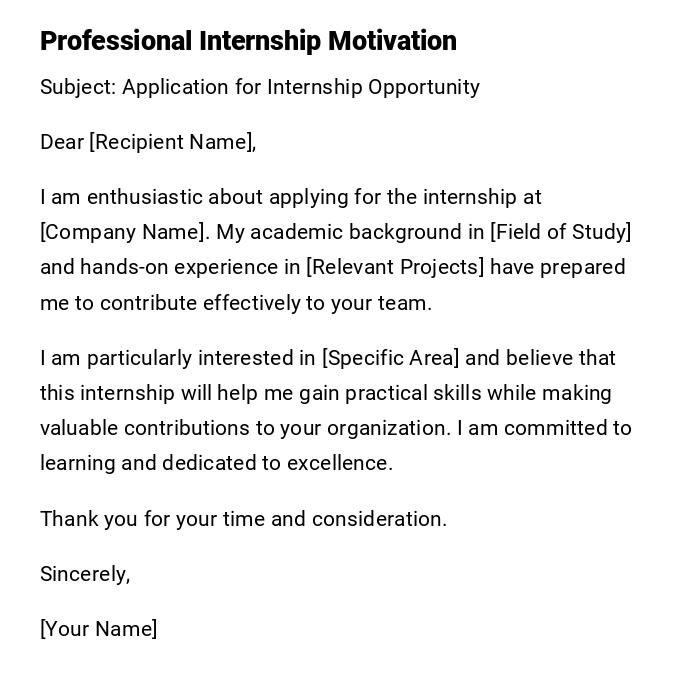
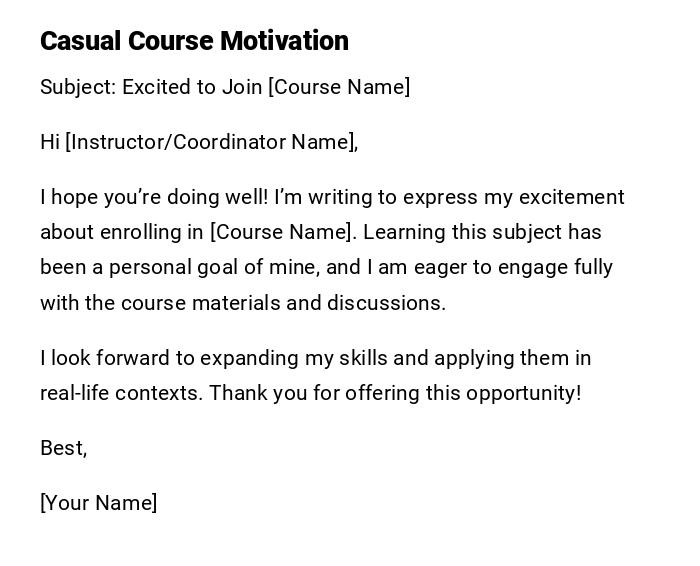
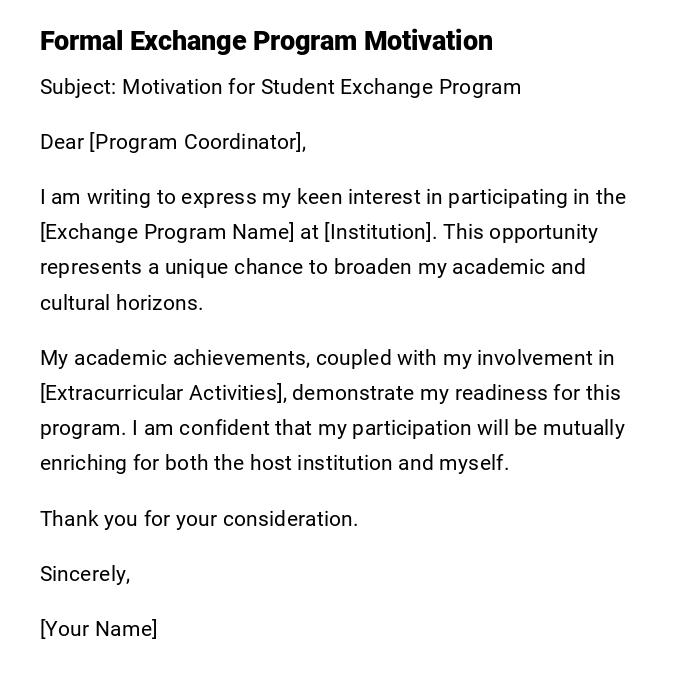
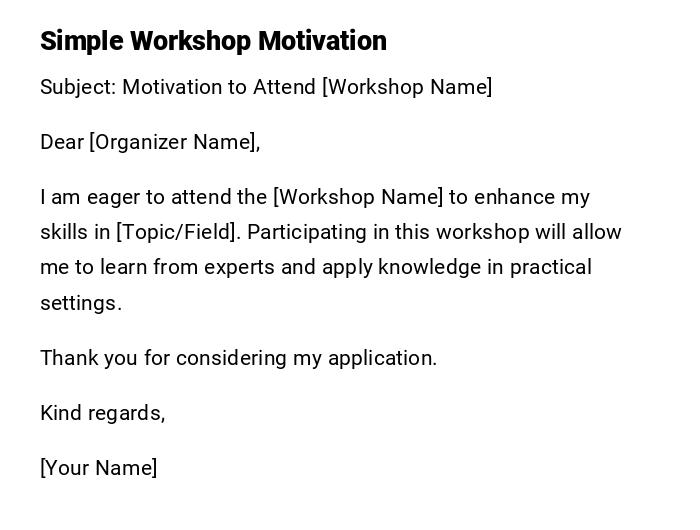
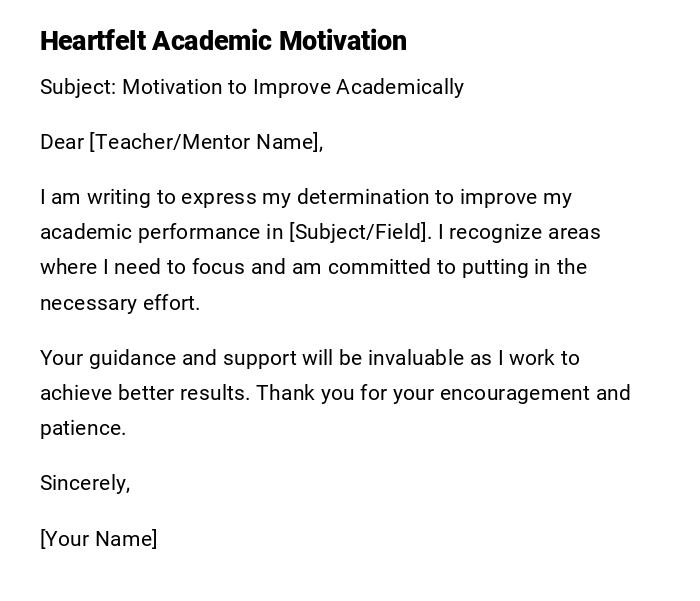
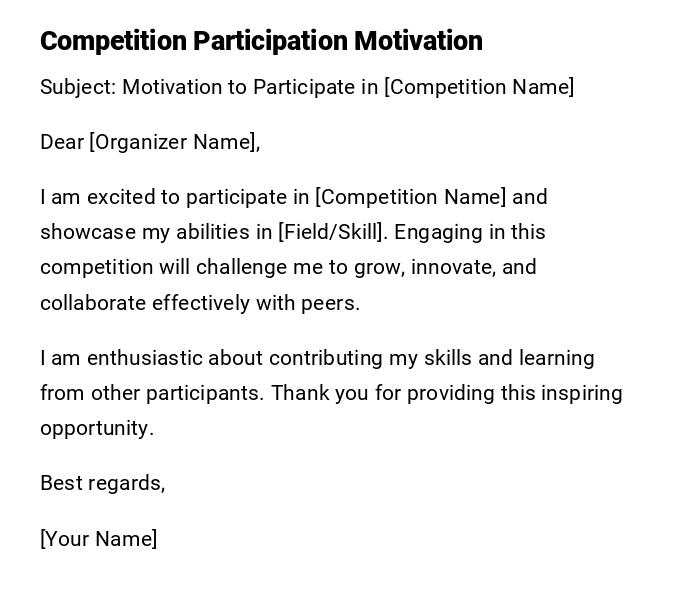

 Download Word Doc
Download Word Doc
 Download PDF
Download PDF